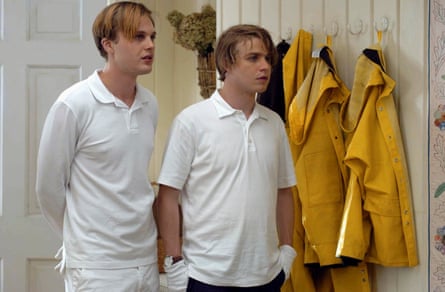Having made his first, brazenly ambitious feature at the age of 27, and finding himself compared to the young Orson Welles, American writer-director Brady Corbet is used to being on the receiving end of the brutal P-words – “precocious” and “pretentious”. “Those are things you steel yourself for,” he says. Corbet, now 30, expects strong responses because, as he puts it, his films go for “operatic heights… When people totally hate a movie that I’ve made, I totally understand, and if they love it I also understand.”
In London to promote his second feature, Vox Lux, Corbet – pronounced “Cor-bay” – initially resembles your average indie bro: the regulation backwards baseball cap and fuzzy beard, coupled with a comfortable bulk, suggest a laid-back bar-band drummer. However, we’re absolutely not dealing with another Sundance brat. Articulate and thoughtfully confident, Corbet is a hardcore, highbrow Europhile. His passions include writer WG Sebald, artist Anselm Kiefer, and the Finnish modernist composer Kaija Saariaho; his track record as an actor includes work with such blue-chip auteurs as Michael Haneke and Lars von Trier; and he thinks of himself as making “movies where the form is the content”.
All this might not make him the likeliest candidate to direct a film about a messed-up Gaga-esque pop star. But Vox Lux is no routine backstage melodrama: not so much A Star Is Torn as A Star Is Shredded, Piece By Painful Piece, it features Natalie Portman as Celeste, whose celebrity is forged in the crucible of a school shooting, and who later becomes implicated in a terrorist attack. This audacious film – mixing exuberant razzle-dazzle with moments of desolate severity – has been hotly praised since its premiere at last autumn’s Venice film festival (“a deeply satisfying, narratively ambitious jolt of a movie,” said the New York Times). But there’s something deeply unsettling about its juxtaposition of showbiz glitz and the horror of mass slaughter. Indeed, the project nearly came to a standstill after the bombing at Ariana Grande’s Manchester Arena concert in May 2017. “A lot of people needed to be convinced to carry on making the film,” Corbet says.
He states that he is not making direct connections between pop and terrorism. “The only thing that mass shootings and mass distribution of manufactured hits have in common is spectacle. The movie is about the desire to be iconic. [The desire] to be remembered at any cost is something that seems to be unique to this generation.” What bewilders him, he says, is that “we expect celebrities to be our representatives. It’s totally fair to come down on a politician for misrepresenting you. But there’s a strange expectation of Taylor Swift to take a political stance and support the female Democratic nominees. Even if that’s who I support, why should she have [to have] an opinion about it?”
Vox Lux has struck some as facile, or cartoonish: the Guardian’s deputy music editor, Laura Snapes, tweeted, “It’s like what my nana thinks pop music is like.” But the broad strokes are intentional, Corbet insists – not least in Portman’s flamboyantly spiky performance as Celeste, a manic conflation of multiple female stars, Gaga and Judy Garland included.
“It’s not just Madonna, it’s not just Britney Spears, it’s not just Lindsay Lohan – the character is such a dragon, and embellished to such operatic extremes. I would never want anyone to think I was making fun of them, because I’m not.” Being a pop star is “an inherently absurd line of work”, Corbet says, but he’s also fascinated by the burnout factor faced by performers on tour: “If you’re shooting a movie for 30 days, you usually come home and polish off a bottle of wine. If I was doing it 200 days a year, I’d probably have a heart attack or liver failure. It’s easy to see how folks start to come undone.”
Born in Arizona, raised in Colorado, Corbet is the only son of a single mother who worked in the mortgage industry. First taken to a casting call aged seven, he got his debut role at 11 in the sitcom The King of Queens. The work that followed ranged from voiceovers for Japanese anime series to TV shows including 24. He even played rocketeer Alan Tracy in the live-action version of puppet favourite Thunderbirds – which sits oddly with the fact that, by 12, he was already developing a passion for the heavyweight cinema of Tarkovsky and Carl Theodor Dreyer.
“I was happy just to work,” he says of the period. “When I was 13 or 14, I appreciated being there. As you get a little bit older, it’s not worth just being there; you have to be there for a reason. Whenever I was working on something that was really silly, I was quite embarrassed by it.”
One role that proved harder-edged than most was as an inscrutable killer in Haneke’s Funny Games – not the chilling 1997 original, but the Austrian maestro’s somewhat misconceived shot-for-shot American remake. Corbet had met the director already, approaching him as a fan when Haneke introduced a film in Los Angeles (Corbet has never been afraid to walk up to, or write to, people he’s keen to know). “I thought it would be interesting to see Michael work in the American system – and it was!” he laughs. “Afterwards, he said, ‘I’m never going to make a movie in America again.’ And I understand why – I’m not making my next movie in America either.”

Corbet has since worked with several luminaries of the European art-house: Von Trier (in Melancholia), Mia Hansen-Løve (Eden), Ruben Östlund (Force Majeure). He gravitates towards film-makers who “are able to do very bold work, but in a kind way”. What he learned from seeing these directors work is that “everyone has a bad day. It made me realise that you don’t always have to have an answer – you can be in pursuit of an answer… that’s OK.”
In 2015, Corbet made his directing debut, The Childhood of a Leader, starring Robert Pattinson – a period piece about a Little Lord Fauntleroy tyke who grows up to be a fascist dictator. With its tone of moody portentousness and its bravura finale, it didn’t convince everyone, but it aimed high and showed indomitable nerve. It won the best debut film and best director awards from a Venice jury and it was the jury’s president, the late Jonathan Demme, who made that Orson Welles comparison.
One coup of the film was its imposing orchestral score by the late experimental visionary Scott Walker – a supposedly reclusive man whom Corbet found surprisingly approachable. When the director wrote suggesting they collaborate, “I thought I was sending out a message in a bottle, but he wrote back quickly. He was very private, of course – but he was a guy from Ohio, I felt immediately comfortable with him. He was totally unpretentious; a really sweet guy and really open.”
Walker returned for Vox Lux: his orchestrations are played off incongruously against the pumping dance numbers written by indefatigable hitmaker Sia. She might seem Walker’s polar opposite, but she too has cultivated anonymity and a distance from the public gaze.
“I loved the idea of having a faceless writer writing these songs,” says Corbet. “The thing about Sia is that she’s an adult, and not many pop stars are. Not many people have the perspective to create a catalogue of 20 years of Celeste’s music – cheerleader anthemic pop, stuff that’s more EDM-influenced, stuff that’s dramatic with dated synths…”
These songs fuel the concert sequence that concludes Vox Lux, with Portman energetically fronting a leotarded dance troupe. “She only shot her role in 10 days,” Corbet says, “but she had to prepare for three months. She has a passion for the arts in general – capital A – and she went all in. The concert sequence was shot in about eight hours – she didn’t have a safety net.”
Corbet now lives in New York with his partner, Norwegian director Mona Fastvold, and their four-year-old daughter. While he won’t rule out acting again, directing has become a full-time job, and an exhausting one: “Movies are so difficult – they make you balder, they make you fatter, you have to fight to get them made.” But he’ll keep fighting to live up to those demanding, serious-minded, sometimes recondite artists that inspire this resolutely un-pop guy. “I always liked things that I found bold. I always found, the bolder the better.”
Vox Lux is on general release now
